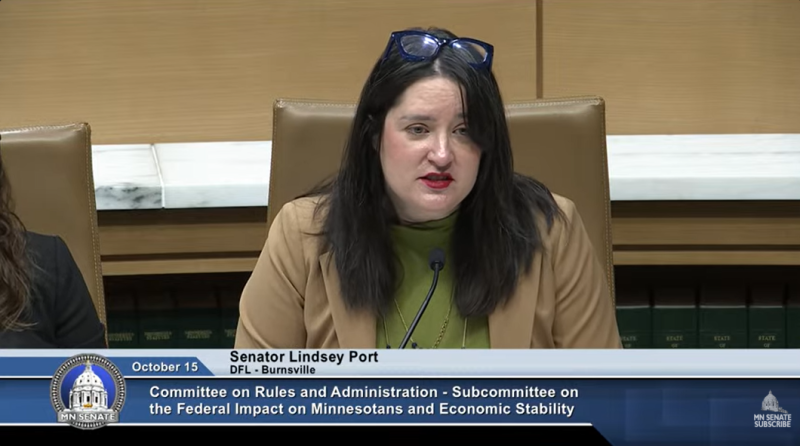Health
Minnesota Senate Subcommittee Examines Rising Health Insurance Costs

A Minnesota Senate subcommittee convened on October 15, 2023, to discuss significant changes expected in the state’s health insurance landscape by 2026. Testimonies from hospitals, insurance experts, and business owners highlighted the pressing issue of rising costs faced by individuals purchasing health insurance on the individual market. Chair of the Subcommittee on the Federal Impact on Minnesotans and Economic Stability, Sen. Lindsey Port (DFL-Burnsville), noted the financial strain many Minnesotans are experiencing as they begin to shop for their insurance plans for the upcoming year.
One of the most critical topics addressed was the impending expiration of the enhanced advance premium tax credit at the end of 2025. This tax credit currently assists those earning more than 400% of the Federal Poverty Guidelines (FPG) by lowering their monthly premiums. According to Grace Arnold, commissioner of the Minnesota Department of Commerce, approximately half of the 187,000 Minnesotans enrolled in the individual market will be affected by this change.
Arnold projected that around 90,000 individuals could see an average increase of $2,000 per year in their insurance costs. This increase coincides with an average premium hike of 21.5% for individual market plans in 2026. With many younger and healthier adults likely to drop coverage due to these rising costs, the market could see a shift towards a higher proportion of older, sicker enrollees, resulting in further increases in rates.
Additionally, Libby Caulum, CEO of MNsure, the state’s independent health insurance marketplace, illustrated the impact of this change with a specific example. A family of four in Freeborn County, with an annual income of $105,000 (or 325% of the FPG), will see their monthly premium rise from $143 in 2025 to $490 in 2026 if they maintain the same plan.
The hearing took place just a day before MNsure shoppers could preview their 2026 plan options, with open enrollment set to begin on November 1. Experts also discussed potential repercussions of federal Medicaid changes introduced in the One Big Beautiful Bill Act. Lynn Blewett, a professor at the University of Minnesota’s School of Public Health, warned that Minnesota might lose up to $154 million in fiscal year 2026. An estimated 170,000 to 180,000 individuals could become uninsured due to new work and verification requirements.
The impact of rising health insurance costs extends beyond individual consumers. Leaders from the Minnesota Hospital Association expressed concern about the financial strain on hospitals due to reduced Medicaid enrollment. They estimate that the state’s hospitals could collectively lose $354 million annually in Medicaid payments while facing an additional $269 million in charity care costs for low-income patients.
Mary Krinkie, vice president of government relations at the Minnesota Hospital Association, emphasized the precarious position of nonprofit hospitals. “We know that we will be forced to close additional services if these cuts come to full fruition,” she stated.
For Zander Abbott, president and CEO of Northfield Hospital and Clinics, the potential closure of services at other rural facilities would lead to increased demand at remaining locations. “We’re not going anywhere,” Abbott asserted. “We’re going to be around to serve the people in our communities, but this is making it harder and harder.”
In her closing remarks, ranking minority member Sen. Carla Nelson (R-Rochester) urged the subcommittee to focus on actionable responses to rising health care costs. She highlighted previous state budget surpluses that were not allocated to health care and criticized the millions lost to recent fraud events. “We want to point our finger at Washington, D.C., and, well, we don’t have that control there,” Nelson remarked, calling for greater attention to state-level solutions.
Following the hearing, subcommittee members from the Democratic-Farmer-Labor Party addressed the ongoing federal government shutdown, linking it to essential issues such as the renewal of the enhanced tax credit and the reversal of recent Medicaid cuts. A continuing resolution to fund the government requires 60 votes in the Senate, a challenge that Sen. Port emphasized, stating, “When you need the votes, you have to earn the votes.”
This subcommittee is part of the Minnesota Senate’s Committee on Rules and Administration, which previously held a hearing on October 1 focused on federal cuts to the Supplemental Nutrition Assistance Program (SNAP). As of October 15, no additional hearings are scheduled.
-

 Science2 months ago
Science2 months agoUniversity of Hawaiʻi Joins $25.6M AI Project to Monitor Disasters
-

 Business2 months ago
Business2 months agoForeign Inflows into Japan Stocks Surge to ¥1.34 Trillion
-

 Top Stories2 months ago
Top Stories2 months agoBOYNEXTDOOR’s Jaehyun Faces Backlash Amid BTS-TWICE Controversy
-

 World2 months ago
World2 months agoBoeing’s Merger with McDonnell Douglas: A Strategic Move Explained
-

 Top Stories2 months ago
Top Stories2 months agoCarson Wentz Out for Season After Shoulder Surgery: Urgent Update
-

 Entertainment2 months ago
Entertainment2 months agoSydney Sweeney Embraces Body Positivity Amid Hollywood Challenges
-

 Top Stories2 months ago
Top Stories2 months agoMarc Buoniconti’s Legacy: 40 Years Later, Lives Transformed
-

 Lifestyle2 months ago
Lifestyle2 months agoKelsea Ballerini Launches ‘Burn the Baggage’ Candle with Ranger Station
-

 Health2 months ago
Health2 months agoInnovative Surgery Restores Confidence for Breast Cancer Patients
-

 Sports2 months ago
Sports2 months agoSteve Kerr Supports Jonathan Kuminga After Ejection in Preseason Game
-

 Entertainment2 months ago
Entertainment2 months agoZoe Saldana Advocates for James Cameron’s Avatar Documentary
-

 Science2 months ago
Science2 months agoChicago’s Viral ‘Rat Hole’ Likely Created by Squirrel, Study Reveals









